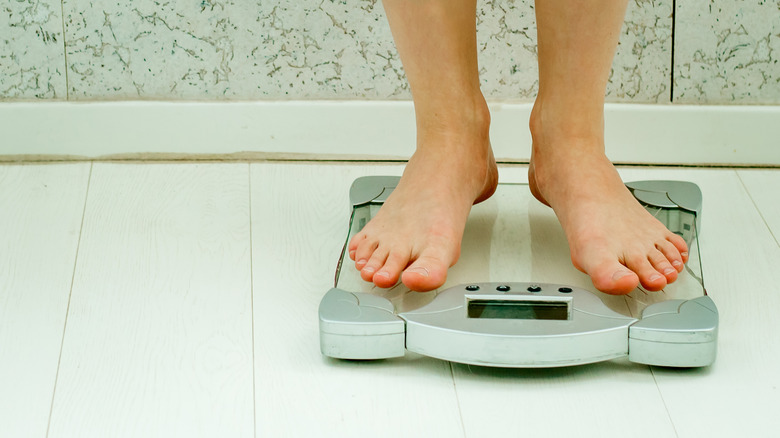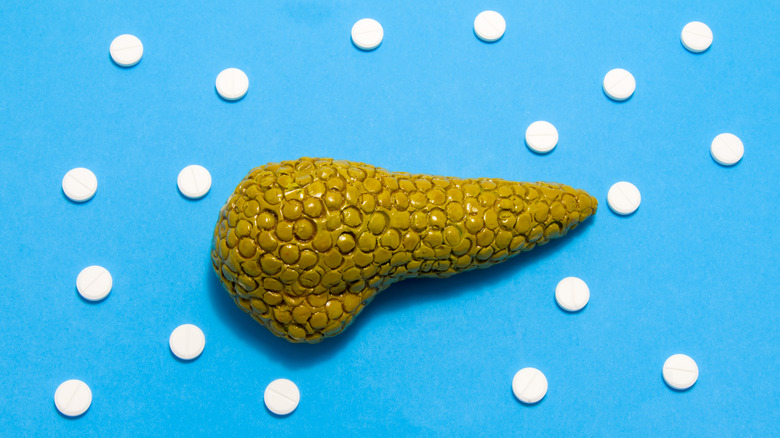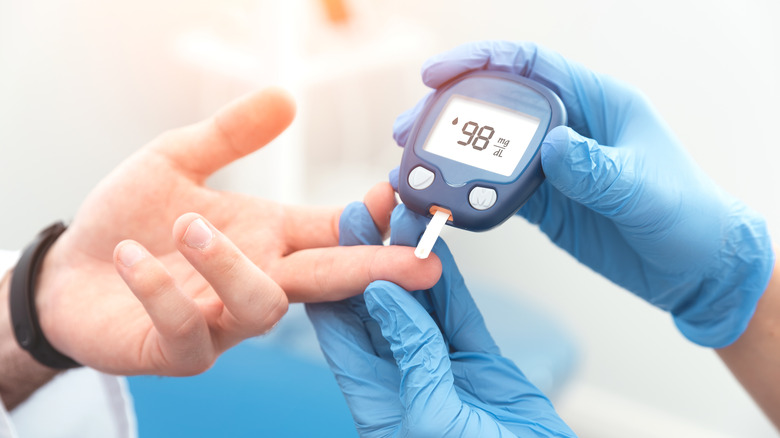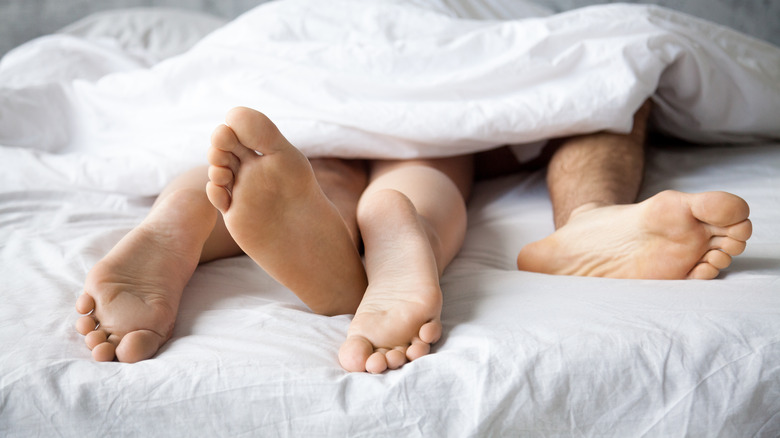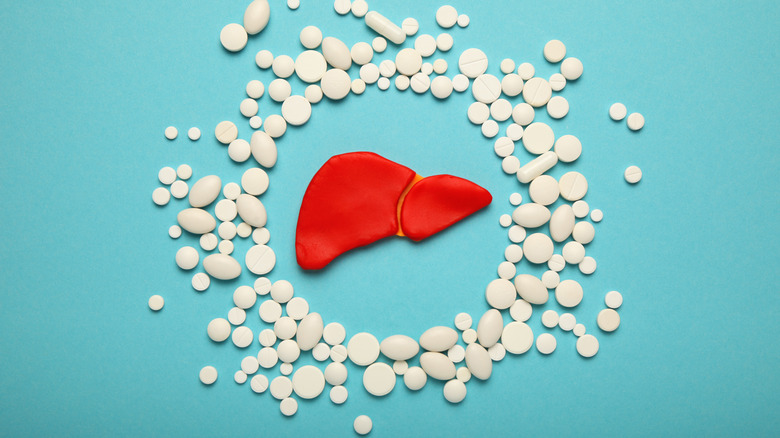What Eating Too Much Sugar Does To Your Body
Is eating too much sugar awful for you? Well, according to registered dietitian Lindsey Kane, sugar gets a bad rap. "We're often told that sugar is the devil, but as always, there's more to the story," she told The List. "After all, sugar is the body's number one preferred source of fuel, not to mention, it's the speediest source of energy since we can digest, absorb, and convert it into energy more efficiently than protein and fat." As always, sugar in moderation is totally fine, as long as you're in relatively good health.
Sugar only becomes the devil when you eat too much of it, which everyone has at some point or another, according to Kane. After all, who hasn't had a hard time saying no to the second doughnut, or gone a little too crazy with the leftover birthday cake at work? But if you're going on regular sugar benders, there could be some pretty serious health consequences, according to the experts. Read on the find out what happens to your body when you eat too much sugar.
Eating too much sugar can make you feel good... for a while
Let's face it: Sugar tastes delicious. Whether it's cake, cookies, candy, soda, or ice cream, sugar has a sweet flavor that's very pleasurable on the palate. There's a reason for that, according to Dr. Lina Velikova, who says that eating sugar causes all kinds of hormones to be released in the brain. "When you eat sugar, your body starts rapidly producing serotonin and dopamine. These are happiness hormones that make you feel good and energized," she explained to The List. "People easily get hooked on sugar precisely because of this feeling." There's nothing quite like that first bite of chocolate!
Unfortunately, that good feeling doesn't last for very long, as that state of bliss isn't sustainable for your body. "However, after the initial surge, your body isn't able to maintain the same production of these hormones," she added. So if you're going to binge on bon bons and eat too much sugar, just know that the high won't last forever.
Eating too much sugar can make you tired
So what happens after your body ceases the production of serotonin and dopamine brought on by eating too much sugar? According to registered dietitian Diana Gariglio-Clelland, you might find yourself feeling a little bit cranky, and ready for a nap. "Eating a large amount of sugar can lead to imbalances in blood sugar and energy levels," she revealed to The List. "The rise and fall of blood sugar levels can cause some people to be irritable and feel fatigued." That's how you wind up having a sugar crash.
Of course, there's a scientific reason for that. "Sugary foods are digested and processed quickly because sugars are simple in chemical nature," Gariglio-Clelland continued. "This means that they don't provide long-lasting energy, and can lead to 'crashes' in energy levels." To that end, Gariglio-Clelland recommends instead choosing foods that take longer to digest for energy, such as veggies, fruits, nuts, and meats. Doing so will help you maintain a more healthy blood sugar level.
You might be more depressed if you eat too much sugar
Eating a bunch of sugary snacks in the short-term can feel great. Not only do you get those pleasure hormones going, but that delicious taste can also distract you from almost anything. But according to an article in the journal Scientific Reports, eating a diet that's high in added sugar (and processed foods in general) might raise the likelihood that you'll get a depression diagnosis.
Specifically, the study followed 8,000 people over a total of 22 years, and concluded that men who ate 67 or more grams of sugar daily were 23 percent more likely to get depressed than men who consumed 40 grams or less per day (via Psychology Today). As if that wasn't enough glaring evidence for you, a study in the American Journal of Clinical Nutrition found that out of nearly 70,000 women, those who ate the most sugar were more likely to develop depression than their counterparts. Looks like the proof is in the pudding when it comes to eating too much sugar.
You're going to gain weight if you regularly eat too much sugar
It would be pretty amazing if there was a magic pill that allowed you to eat as much as you wanted without gaining an ounce of weight. Can you imagine just chowing down on ice cream and pizza without having to worry about fitting in your clothes the next day?
But alas, as most of us know, overeating causes weight gain, and sugar can be a major culprit in that process, according to scientist Bart Wolbers, MS. "If you consistently consume too much (nutritionless) sugar without an otherwise adequate diet, you'll gain weight and deplete your body of nutrients," he shared with The List. "The weight gain — rather than the consumption of calories from sugar — is what creates very adverse health outcomes over time."
So while it would be amazing to chow down without having to consider your health, that's the reality of the situation. Once again, moderation is the key to enjoying the foods you love while remaining healthy, so avoid eating too much sugar.
Your pancreas will be overworked if you eat too much sugar
When it comes to how your body deals with metabolizing sugar, there's one especially important organ that does the heavy lifting. "The pancreas is the organ responsible for producing all the enzymes and hormones your stomach needs to break down the food," Dr. Nikola Djordjevic told The List. "Insulin is one of the hormones that pancreas produces, which controls how much glucose (the broken sugar) your cells take." So that one little organ does a whole lot of work.
To that end, as much as mowing down a couple slices of pie in one sitting can be an indulgent Thanksgiving tradition, it's going to cause your pancreas to work overtime. "When you eat too much sugar, the pancreas needs to respond by working a lot to create enough insulin," Djordjevic continued. "While overeating sugar will not harm your pancreas short-term, it will put a strain on it." So make sure you bear that in mind next time you buy the family-sized bag of cookies.
Eating too much sugar might lead to type 2 diabetes
One especially harmful thing that can result from chronically eating too much sugar is that you can develop type 2 diabetes. That's because, in order to deal with the extra sugar, your pancreas works overtime making insulin, causing your blood sugar level to spike. "Glucose levels buildup in the bloodstream and the body pulls water from muscles and other tissues to flush the toxic levels out," Dr. Ralph E. Holsworth told The List. "Sugar 'spills' over into the body's urine requiring the kidneys to work harder. Physicians in ancient times tasted urine, and a sweet taste indicated the patient had diabetes." And while there are more hygienic ways to test for that now, the outcome remains the same.
Type 2 diabetes is not something to be taken lightly, either, as it can be dangerous, especially when it's not well-managed. "Diabetic ketosis is an extreme life-threatening state in diabetic patients who cannot produce insulin," Holsworth continued. "Blood glucose levels spike with extreme dehydration requiring immediate hospitalization, fluid management and glucose control with IV insulin." That does not sound pleasant at all!
Eating too much sugar can make you dehydrated
Have you ever noticed that after you polish off that pint of ice cream, you feel thirsty? That's because your body is using the water that's available in your system, so more will be needed, according to registered dietitian Lindsey Kane. "Remember, your body likes homeostasis and will do whatever it takes to maintain it," she explained. "So, in response to high blood sugar (hyperglycemia), the kidneys will actually pitch in and help drive blood sugar levels down by shifting water to the bloodstream (to dilute the blood sugar concentration), and simultaneously, works to filter and excrete the sugar through urine."
And yes, while that's the same mechanism that's at play with type 2 diabetes, this can happen to anyone who eats too much sugar. "It's the body's way of managing high blood sugar levels," Kane added. Now it makes sense that milk is so often paired with cookies!
If you have hypoglycemia, you'll have these symptoms if you eat too much sugar
It's very important to be aware of any health conditions that you may have that might be impacted by eating too much sugar, such as either type of diabetes. If you're not mindful of what you're eating or if you have a diagnosis or suspect you might be diabetic, the consequences can be pretty bad, according to the Mayo Clinic.
Additionally, there's a specific condition that registered dietitian Diana Gariglio-Clelland points out that can be affected by a sugar bender. "Some people have a condition called reactive hypoglycemia, which means the pancreas responds very well to the sugar and releases a lot of insulin, causing blood sugar levels to fall after eating a high-sugar food," she explained. "Reactive hypoglycemia can cause someone to feel drowsy, weak, sweaty, and hungry after eating a lot of sugar." You might also experience lightheadedness, anxiety, confusion, and a paling of the skin. Given the symptoms, it may be best to skip dessert if you have reactive hypoglycemia.
Eating too much sugar can give you skin issues
Do you have an important event coming up like a wedding or an in-person job interview? Maybe you have a photo session scheduled or a TV interview on the horizon? You might want to lay off the sweets for at least a few days beforehand, or you might find yourself aggravating your skin. "High sugar intake increases inflammation in the body," said Caleb Backe, a certified personal trainer. "This inflammation extends to the skin which means that if you eat too much sugar, you could be exacerbating existing skin conditions."
Even if you don't have any adverse skin conditions, you could still set yourself up for a breakout before your big day. "Additionally, the inflammation has the potential to increase your cortisol production, which is the hormone that regulates your sebum production, Backe continued. "Imbalances in sebum can cause your skin to become oily which results in breakouts." And that's the last thing you need when you plan to look your best!
Eating too much sugar might make you age faster
Acne isn't the only skin problem you could be dealing with if you eat too much sugar. Rather, if you have an incorrigible sweet tooth, you might find that your skin ages faster than those who don't consume a lot of sugar.
Essentially, according to a study in the journal Nutrients, a diet high in sugar and refined carbohydrates causes your body to increase production of advanced glycation end products (AGEs), which cause damage to elastin and collagen. Given that elastin and collagen are what keep your skin smooth and firm, it makes sense that you skin would be more prone to wrinkling with more AGEs hanging around.
This was confirmed in another study in the American Journal of Clinical Nutrition, which surveyed 4,025 women between the ages of 40 and 74. They found that women who had a diet high in carbohydrates (including sugar) had more wrinkles in their skin than women who consumed a diet lower in carbohydrates. That's some bad news for carb lovers everywhere (and who doesn't love carbs?).
Your libido may decrease if you eat too much sugar
As if sugar hasn't done enough already, according to Caleb Backe, increased sugar consumption is linked to a decreased libido in men. "Research shows that an increase in sugar in your system can reduce testosterone production by up to 25 percent," he told The List. "This is a dramatic change in hormone levels in a short timespan post-ingestion. This indicates that eating too much sugar can have a significant negative impact on your libido, potentially causing erectile dysfunction." That's some bad news for the gents out there!
Unfortunately, women aren't off the hook when it comes to sugar causing intimacy problems either, according to Dr. Christine Greves, an OB/GYN. "Eating a lot of foods high in sugar may increase the likelihood of a woman acquiring a vaginal yeast infection in the right environment," she shared in an interview with Bustle. "Yeast absolutely loves sugar, warmth and moisture. Foods that are high in sugar ... can increase a woman's risk for having that if the environment is warm and moist." That would certainly put a damper on your bedroom plans, for sure.
Eating too much sugar can increase your risk of heart disease
According to the CDC, heart disease is the leading cause of death in the United States for both men and women, which is a pretty sobering statistic. One in every four people passes away from heart-related illnesses. And you guessed it: Eating a diet high in sugar puts you more at risk of developing heart disease. That's because it can lead to elevated blood sugar levels, high blood pressure, high triglycerides, inflammation, and obesity, as reported by a study in the journal Progress in Cardiovascular Diseases.
If 17 to 21 percent of all the calories you consume comes from added sugars, you're 38 percent more likely to succumb to heart disease than those who only get 8 percent of their calories in that manner, according to a study in the journal JAMA Internal Medicine (via Harvard Health Publishing). Time to swap out the soda for sparkling water, and stop eating too much sugar!
Can eating too much sugar increase your cancer risk?
If your diet is consistently high in sugar, that could put you at an increased risk of a variety of cancers for several different reasons. For one, eating too much sugar can lead to obesity, which increases your risk of cancers like colorectal, renal, and breast cancer by 20 percent, according to a study in the Journal of Obesity. Additionally, high sugar consumption causes inflammation in your body, according to a study in the journal Current Diabetes Reports, which may lead to the development of insulin resistance. Both of these increase your risk of getting cancer.
That's not all, either. A study of 430,000 people in the International Journal of Cancer found that eating sugar is linked to developing several different types of cancer, including cancer of the small intestine, pleural cancer, and esophageal cancer. And finally, according to a study in the journal Cancer Epidemiology, Biomarkers & Prevention, women who ate cookies and sweet buns more than three times a week were more at risk of developing endometrial cancer. Um, yikes all around!
Eating too much sugar is bad for your liver
Different kinds of sugar can have different sorts of impacts on some parts of your body, and this is indeed the case with fructose and the liver. That's because your liver is the only organ in your body that can break fructose down, according to a post in the Harvard Health Blog. That's unlike sugars such as glucose, which can be taken up by a wide variety of cells.
Once fructose is in your liver, your body converts it to glycogen. But since your liver has a finite capacity for glycogen, if there's too much of it present, it will turn into fat, thus causing fatty liver.
So if you regularly eat too much sugar, specifically fructose, such as in sugar-sweetened sodas, you're 56 percent more likely to develop non-alcoholic fatty liver disease (NAFLD) than those who don't, according to an article in the Journal of Hepetology. That's not to say you're going to be at risk if you eat a sensible amount of fruit in your diet, which naturally has fructose. But foods sweetened with high-fructose corn syrup can definitely take its toll on your hard-working liver.




